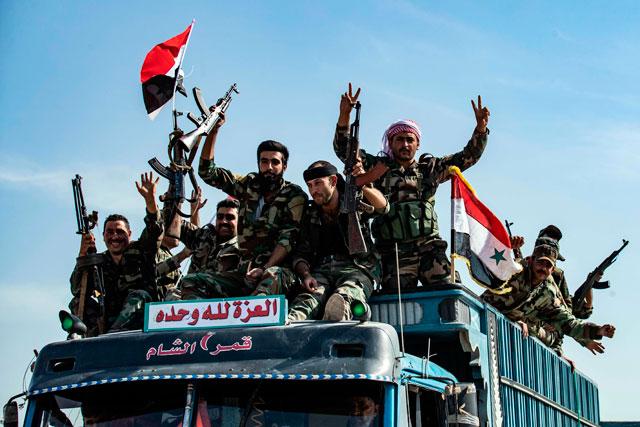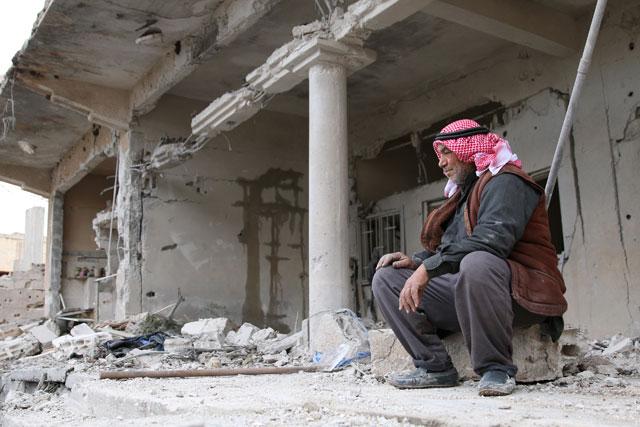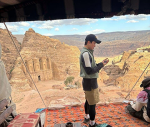You are here
In push to reclaim Raqqa, Trump’s choices range from bad to worse
By Reuters - Feb 25,2017 - Last updated at Feb 25,2017
WASHINGTON — US President Donald Trump’s push against the Daesh terror group in Syria could present him with an unenviable choice: Alienate NATO ally Turkey by relying on Kurdish fighters, or adopt a plan that may slow the assault and require many more US combat forces.
The objective of the coming US-backed offensive is the city of Raqqa, Daesh’s de facto capital, which US officials think the hardline group has been using as a hub to hatch plots against the West.
Despite months of US efforts to allay Turkish concerns, Ankara is insisting the offensive be carried out by local Arab fighters with support from Turkish troops, as opposed to the US-backed Syria Democratic Forces, or SDF, which in addition to Arabs includes Kurdish fighters who Turkey considers a threat.
As Ankara warns of a major rupture in ties if its concerns are ignored, US and Turkish military officials have been reviewing Turkish proposals for the Raqqa campaign in recent days, one US official said. No decision has been reached, officials said, speaking on the condition of anonymity.
A senior Turkish official, also speaking on condition of anonymity, estimated that as many as 10,000 fighters could be made available for the Raqqa campaign, in addition to Turkish and any US forces backing them.
US officials, however, have questioned whether the Turkish-backed forces are up to the job, at least anytime soon, noting the difficulty Turkish-backed rebels had this week driving Daesh from the town of Al Bab, which is a significantly smaller and easier target than Raqqa.
In a reminder of the threat, even after Al Bab was seized on Thursday, a Daesh car bomb killed more than 50 people in a nearby Syrian village on Friday.
It is also unclear how Turkish forces would get to Raqqa, perhaps by carving a path through Syrian-government-held or Kurdish-held territory. A US intelligence official also noted that Turkey might want to clear the town of Manbij of Kurds before going to Raqqa.
Turkish-backed forces may still need to be trained and, potentially, supplemented by a far larger number of American troops than the 500 special operations forces in Syria now — all factors that could slow and complicate the Raqqa campaign.
“To the extent that President Trump has expressed a desire to take Raqqa as quickly and forcibly as possible, the only force that’s poised to do that is the SDF,” said Blaise Misztal, the director of the national security programme at the Bipartisan Policy Centre.
More US troops?
The SDF, on the other hand, is far larger than Turkey’s proposed force.
The Arab component of the SDF that would aid the Raqqa operation is estimated at around 27,000, US officials say, but US intelligence officials say it remains disorganised and unevenly trained and requires support from Kurdish forces that are the alliance’s best local fighters.
Even if the United States supports the SDF in the assault, US military officers hint that more US troops might be needed.
CBS News quoted US General Joseph Votel, the head of the Central Command, who visited Syria on Friday, saying earlier this week that the forces the United States is backing “don’t have as good mobility; they don’t have as much firepower.
“So we have to be prepared to fill in some of those gaps for them,” he said.
A decision to go with the SDF could create logistical hurdles for the United States because Turkey would likely oppose allowing US troops to deploy on its border to provide close air support and long-range rocket artillery fire for the operation, said an adviser to the US military.
Turkish ire could also complicate the flow of supplies to the front lines, the adviser added.
“More would come through Iraq, and it goes a bit slower and you get protests and consternation from the Turks,” the adviser said, speaking on condition of anonymity due to the discussions.
Who would hold Raqqa after Daesh is expelled is a factor in Syria’s long-term stability. Misztal questioned whether Syrian President Bashar Assad would let Turkish forces hold the city. Turkey has warned that any Kurdish-dominated force could trigger a backlash by the city’s mostly Sunni population.
Marine Corps General Joseph Dunford, chairman of the Joint Chiefs of Staff, acknowledged the challenges in Syria during a forum in Washington on Thursday.
“When we provide [Trump with] options, we’ll talk about the importance of our Turkish ally and making sure that our plans are consistent with maintaining a strong alliance with Turkey,” Dunford said, listing other factors the president will have to consider, including the role of the Kurds.
He did not discuss specific options before the completion of a draft plan for combating extremist militants, which is due by Monday.
Related Articles
BEIRUT — More than a dozen Syrian rebels have died in hit-and-run clashes with a US-backed alliance dominated by Kurdish forces in the count
RAS AL AIN, Syria — Kurdish fighters battled to defend a key Syrian border town from Turkish-backed forces on Tuesday as Russia seized on a
BEIRUT — Syrian Kurdish militias and their allies expect continued US support for their war against the Daesh terror group in northern Syria


















